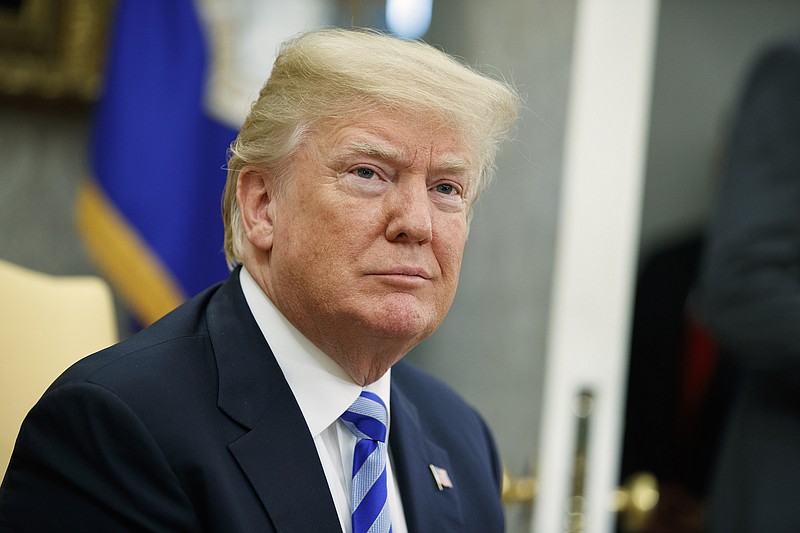My wife is building a language museum in Washington (I'm its vice chairman), so people often send her funny examples of word play, including a list of mixed-up idioms from oxforddictionaries.com. Among my favorites: "Don't judge a book before it's hatched." "Every cloud has a silver spoon in its mouth." "It's not rocket surgery." "You can't teach a leopard new spots." And one that perfectly describes President Donald Trump's approach to every one of Barack Obama's policies, including his nuclear deal with Iran: "We'll burn that bridge when we come to it."
And that's my subject for today. Trump, by taking a hard line on Iran, drew some needed attention to Iran's bad behavior and created an opportunity to improve the nuclear deal. But to do so would have required Trump to admit that there was merit in the deal Obama had forged and to be content with limited, but valuable, fixes that our European allies likely would have embraced.
Instead, Trump pushed for the max, torched the whole bridge, separating us from Germany, France and Britain, undermining the forces of moderation in Iran and requiring Trump to now manage - on his own - a complex, multidimensional confrontation with Tehran.
Obama's view of the Middle East was that it was an outlier region, where a toxic brew of religious extremism, tribalism, oil, corruption, climate change and mis-governance made positive change from outside impossible; it had to come from within. By the end of his eight years, Obama was skeptical of all the leaders in the Middle East - Iranian, Arab and Israeli - and of their intentions.
It made Obama a policy minimalist on the Middle East: keep it simple and focus on the biggest threat. That meant joining with Britain, France, Germany, Russia and China to keep the most dangerous weapons - nuclear weapons - away from the most dangerous bad actor there - Iran. By lifting sanctions on Iran as part of the deal, Obama hoped Iran would become integrated into the world and moderate the regime.
The latter did not happen, but the former did. Iran agreed to tight restrictions on its enrichment of nuclear weapons-grade materials for 15 years in return for an easing of sanctions.
"It was a transactional deal that kept Iran's latent nuclear capabilities latent - not a grand bargain, not a transformational breakthrough encompassing all of Iran's objectionable behavior," said Robert Litwak, an expert on the Iran negotiations at the Woodrow Wilson International Center for Scholars. The deal never covered Iran's regional aggression or its ballistic missile program.
By contrast, Trump's team is made up of maximalists. They want to limit Iran's ballistic missile program, reverse its imperialistic reach into the Sunni Arab world, require Iran to accept terms that would ensure it could never ever enrich enough uranium for a nuclear bomb, and, if possible, induce regime change in Tehran.
But Trump has left many key questions unanswered: Who is going to take over in Tehran if the current Islamic regime collapses? One thing we have learned from the Arab Spring uprisings that toppled their leaders is that in almost every country the alternative to autocracy turned out not to be democracy, but disorder or military dictatorship.
It is true that Iran has projected its power deep into the Arab world. Is Trump going to use U.S. forces to push Iran back? No. Does he have Arab forces to do so? No. And now, does he have European allies to do so? No. So how exactly is this Iranian tide going to be reversed?
To his credit, Trump has drawn attention to Iranian misbehavior in ways the Europeans never have. Israel gets censured for implanting settlements deep into the West Bank. Saudi Arabia and the United Arab Emirates get censured for contributing to the humanitarian crisis in Yemen. But the Iranians have gotten away with murder, mass murder, at home and abroad - with virtually no censure.
Good for Trump for calling Iran out, but he still needs a strategy to translate his pressure on the country into sustainable gains. "Strategy without leverage is feckless," noted the Carnegie Endowment's Karim Sadjadpour. "And leverage without strategy is reckless."
Trump should have kept it simple, too. Rather than scrapping the deal, he should have told the Europeans that all he wanted to stay in the deal were three fixes:
-Extend the ban on Iran's enriching of uranium to weapons grade from the original 15 years Obama negotiated to 25 years.
-Europe and the U.S. agree to impose sanctions if Iran ever attempts to build a missile with a range that could hit Europe or America.
-The U.S. and Europe use diplomacy to spotlight and censure Iran's "occupations" of Syria, Iraq and Lebanon.
Just improving on what Obama started would have greatly advanced U.S. interests - a 25-year assurance, with intrusive inspections, that Iran could not suddenly build a bomb. And it would have left us arm in arm with our closest allies, rather than us now threatening to sanction their companies if they trade with Iran.
But Trump wanted to crush both Obama and Iran, and so he trashed the whole deal. Well, as the oxforddictionaries.com blog on mixed idioms would tell him: Donald, "You've opened your can of worms, now lie in it."
The New York Times
